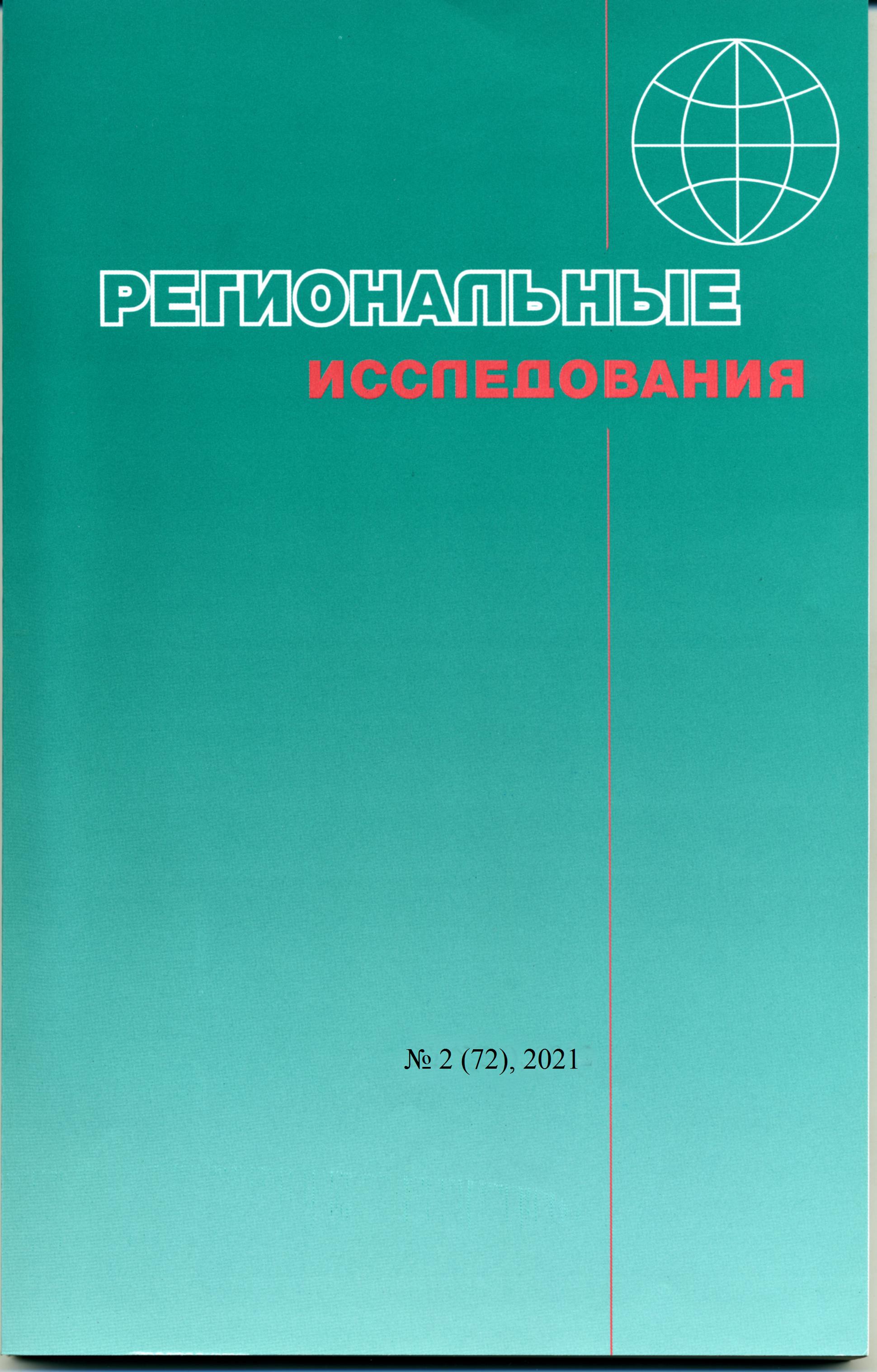Faykov D.Yu., Baydarov D.Yu. Current state and possibilities of development of closed cities of nuclear industry
DOI:
https://doi.org/10.5922/1994-5280-2021-2-9Keywords:
closed administrative-territorial entity, ROSATOM State Corporation, diversification, single-industry town, innovative development, US National LaboratoriesAbstract
The article examines the current trends in the development of closed cities of the nuclear industry, the changes taking place in them and the opportunities for development. The relevance of these issues is due to the need to use the scientific and technological potential of cities for the innovative development of the country. Based on foreign experience, it is confirmed that the presence of nuclear industry enterprises on the territory contributes to the creation of innovative ecosystems, makes the territory attractive for business development. In terms of socio-economic development, attention is focused on the movement of the population, the activities of city-forming enterprises and small businesses, the income of the population and local budgets. New trends characteristic of closed cities are identified: strengthening the role of the ROSATOM State Corporation in the management system of nuclear closed cities; diversification of their economy based on the stable operation of the city-forming enterprise and the creation of other high-tech industries with the participation of the ROSATOM State Corporation; the dependence of the population of cities on the state of affairs at the city-forming enterprise; weak interest in the development of small businesses; the appearance of pendulum migration. The further development of closed cities through the expansion of the market of highly qualified labor in them is proposed: the activation of civil research and development; the formation of research networks using unique scientific installations and supercomputer capacities, etc. To attract qualified labor, it is necessary to create comfortable living conditions, which is more likely with the participation of the ROSATOM State Corporation. Some of the proposals are being tested. The results obtained may be of methodological and practical interest not only for closed cities, but also for other single-industry towns, as well as city-forming holdings.
References
Анимица Е.Г., Кузнецов В.Н., Ергунова О.Т. Создание территорий опережающего социально-экономического развития в границах закрытых административно-территориальных образований Свердловской области // Успехи совр. науки и образования. 2016. Т. 4. № 12. С. 92–95.
Демографическое развитие России: тенденции, прогнозы, меры. Национальный демографический доклад – 2020 / С. В. Рязанцев, В. Н. Архангельский, О. Д. Воробьева [и др.]; Отв. ред. С.В. Рязанцев. М.: ООО «Объединенная редакция». 2020. 156 с. DOI: 10.25629/HC.2020.13.01.
Заусаева Я.Д. Институциональные факторы развития несостоявшихся атомных городов // Демоскоп. 2015. № 631–632. [Электр. ресурс]. URL: http://www.demoscope.ru/weekly/2015/0631/ analit04.php (дата обращения 12.05.2021).
Кабанова Е.И. «Закрытые» города открываются для инвестиций // Муниципальная академия. 2020. № 4. С. 91–96.
Колесник Е.А. Угрозы и риски диверсификации экономики моногорода // Вестн. Челяб. гос. ун-та. 2018. № 3 (413). Экон. науки. Вып. 60. С. 47–52.
Концептуальные подходы к разработке стратегии развития монопрофильного города / Е.Г. Анимица, В.С. Бочко, Э.В. Пешина, П.Е. Анимица; под науч. ред. А.И. Татаркина, М.В. Фёдорова. Екатеринбург: Изд-во УрГЭУ, 2010. 81 с.
Коржевская А.А. Взаимодействие органов власти и корпоративных структур - одна из моделей инновационного регионального развития // Урал – XXI век: регион инновационного развития. Мат-лы II Междунар. научн.-практ. конф. Екатеринбург: Изд-во УГЭУ, 2017. С. 119–122.
Кузнецова О.В. Межрегиональное сотрудничество в России: перспективы кооперации региональных властей // Региональные исследования. 2019. № 1. С. 16–25. DOI: 10.5922/1994-5280- 2019-1-2.
Кулешова Г.И. Территориальная проблематика научно-инновационной деятельности в контексте инновационной экономики // Фундаментальные, поисковые и прикладные исследования Российской академии архитектуры и строительных наук по научному обеспечению развития архитектуры, градостроительства и строительной отрасли Российской Федерации в 2018 году. Сб. научн. трудов РААСН. М.: Изд-во АСВ, 2019. С. 309–318. DOI: 10.22337/9785432303080-309- 318
Лазаренко В.А. Корпоративная социальная ответственность крупного бизнеса в России // Вестн. Моск. ун-та. Сер. 5. География. 2018. № 1. С. 66–72.
Проскурнин С.Д. Основные предпосылки и тенденции развития ЗАТО ГК «Росатом» // Региональная экономика и управление: электр. научн. журнал. 2019. № 1 (57). С. 1/27-27/27. [Электр.ресурс]. URL: https://eee-region.ru/article/5703/ (дата обращения 21.12.2020).
Развитие моногородов России: монография / колл.авт. под ред. И.Н. Ильиной. М.: Финанс. ун-т, 2013. 168 с.
Розмирович С.Д., Манченко Е.В., Механик А.Г., Лисс А.В. Диверсификация ОПК: как побеждать на гражданских рынках: доклад Экспертного совета Председателя коллегии Военно-промышленной комиссии РФ, подготовлен для V Междунар. Форума технол. развития «Технопром». Новосибирск, 2017. [Электр. ресурс]. URL: http://www.instrategy.ru/pdf/367.pdf (дата обращения: 21.12.2020).
Трапезникова И.С. Современная модель социальной ответственности российского бизнеса в разрезе формирования квалифицированного трудового ресурса территории присутствия // Экономика труда. 2019. Т. 6. № 2. С. 689–698. DOI: 10.18334/et.6.2.39794.
Трейвиш А.И. Город, район, страна и мир. Развитие России глазами страноведа. М.: Новый хронограф, 2009. 372 с.
Трейвиш А.И. Российские города на переходе к рынку: тенденции, проблемы, парадоксы // Эра городов. 1998. № 4. С. 2–3.
Файков Д.Ю. Закрытые административно-территориальные образования. Системные трансформации. Саров: ФГУП «РФЯЦ-ВНИИЭФ», 2012. 394 с.
Файков Д.Ю., Байдаров Д.Ю. Диверсификация производства в атомной отрасли // Экономическое возрождение России. 2020. № 3. С. 96–109. DOI: 10.37930/1990-9780-2020-3-65-96-109.
Файков Д.Ю., Байдаров Д.Ю. Новые тенденции в развитии закрытых административно-территориальных образований (на примере ЗАТО атомной промышленности) // Проблемный анализ и государственно-управленческое проектирование. 2014. Вып. 6. С. 120–131.
Файков Д.Ю., Байдаров Д.Ю. Особенности организации производства гражданской продукции в национальных лабораториях США // Росс.внешнеэкономический вестн. 2020. № 8. С. 40–62.
Чернятин Д.М., Белякова Г.Я. Особенности реструктуризации непрофильных подразделений предприятий ЗАТО Госкорпорации «Росатом» // Экономика и управление нар.хозяйством. Сер.: Экономика и право. 2019. № 1. С. 46–53.
Шаститко А.Е., Фатихова А.Ф. Моногорода России: возможные варианты развития // Государственное управление. Электр.вестн. 2019. Вып. 76. С. 109–135. DOI: 10.24411/2070-1381-2019- 10006.
Bajpai N., Prasad A., Pandey P. Work Life Balance Retention (Wlbr) Model – A Weapon to Retain Hi-Tech Employees // International Journal of Management Sciences and Business Research. 2013. Vol. 2. Iss. 12. P. 92–102.
Salvesen D., Renski H. The importance of quality of life in the location decisions of new economy firms. Report 99–07–13815. Chapel Hill: Center for Urban and Regional Studies, 2003. [Электр. ресурс]. URL: https://www.researchgate.net/profile/David-Salvesen/publication/228494438_The_importance_ of_quality_of_life_in_the_location_decisions_of_new_economy_firms/links/55ad37d408aed9b7 dcdad66d/The-importance-of-quality-of-life-in-the-location-decisions-of-new-economy-firms.pdf (датаобращения: 12.05.2021).

